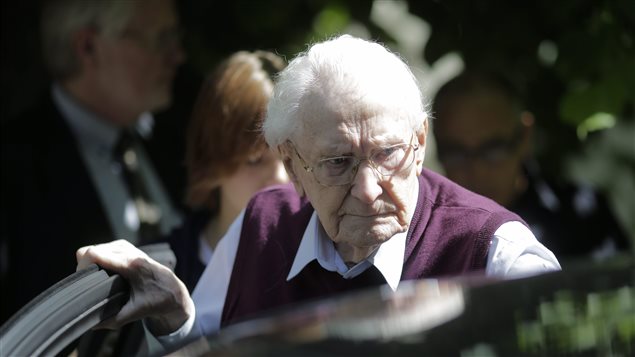Oskar Groening’s sentencing this week brings to an end a trial that was the subject of endless debate. Jill Scott, professor in the department of Languages, Literatures and Cultures at Queen’s University in Kingston, Ontario, and the author of ‘A Poetics of Forgiveness: Cultural Responses to Loss and Wrongdoing, was watching the trial. She says the process and the sentencing raise many questions for the future.
“It has huge implications.”
Scott says many see the sentencing as symbolic. She says the way we understand guilt has changed, morally and legally, which makes it time to review these cases from World War II. Scott says one of the aspects of Groening’s case that has not been addressed, is what this outcome means for cases in the future.
ListenWhen asked about the implications of this case on the situation of survivors and perpetrators of the massacre in Srebrenica, for example, Jill Scott says we have not heard the last of the story. The 20th anniversary of that tragic occasion was marked recently in Toronto, by family members and survivors who have since moved to Canada.
“It’s never over”
“That’s the thing about these gross violations of human rights and war crimes,” says Scott. “It’s never over”. Oskar Groening, who spoke out and refuted Holocaust deniers, said he did feel morally responsible, but not criminally responsible. Jill Scott says, however, in the intervening years, between World War II and now, “we have new interpretations of the law and we have new interpretations of legal or criminal responsibility. Jill Scott says it’s most important to complicate cases such as the Groening trial, and not reduce them to black and white issues.
In Professor Scott’s current research she is also looking into the ‘Peacebuilding Practices and the Future of Indigenous-Settler Relations in Canada’. When asked about the Truth and Reconciliation process in Canada, Professor Scott says we are not ready to talk about forgiveness. She says,”I think we have to talk about redress and we have to talk in very specific terms about what is required to begin conversations about reconciliation and I think that redress, meaning making amends, for example, for the wrongs of Indian Residential schools and the kinds of continued trauma as a result, has to come as a first step. That said, I think you can continue to talk about reconciliation at the same time as you’re pursuing redress.”







For reasons beyond our control, and for an undetermined period of time, our comment section is now closed. However, our social networks remain open to your contributions.